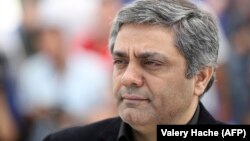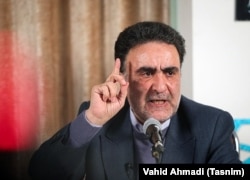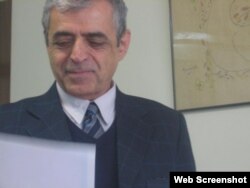Iranian authorities have renewed their crackdown on dissent amid rising antiestablishment sentiment and near daily protests across the Islamic republic.
Prominent government critics have been arrested in recent days, including reformist politician Mostafa Tajzadeh and acclaimed filmmakers Jafar Panahi and Mohammad Rasulof. Other activists have been summoned for questioning by the authorities in recent days.
Analysts say the wave of recent arrests by authorities is a response to rising public discontent over the poor state of the economy, which has been devastated by crippling U.S. sanctions and years of mismanagement. Protests over economic grievances in recent months have often turned political, with protesters directing their fury at the clerical establishment.
The protests come amid a protracted deadlock in attempts by Iran and the United States to revive the 2015 nuclear deal, which curbed Tehran's sensitive nuclear activities in exchange for the lifting of international sanctions. In 2018, then-U.S. President Donald Trump pulled Washington out of the deal and reimposed sanctions.
'Under Pressure From All Sides'
Authorities have resorted to intimidation, arrests, and force to quell the protests in some cases. Prominent Iranian dissidents have expressed their support for the demonstrators and called on law enforcement to lay down their weapons.
Paris-based analyst Reza Alijani said the authorities are trying to sow fear.
"In order to prevent a flare-up of protests and keep things under control, the Islamic republic is targeting those who have civil courage and impact," he told RFE/RL.
"The Islamic republic knows that the economic situation will get worse," he added. "There's also no hope for an opening in the nuclear negotiations. Therefore, [authorities] further securitize the atmosphere, as they know that they are likely to face more protests."
Tehran-based journalist Ahmad Zeidabadi suggested the recent arrests of high-profile dissidents was an act of desperation.
"Iranian officials find themselves under pressure from all sides," Zeidabadi said on Twitter on July 9. "I think this has made them angry and they have made decisions out of anger."
Wave Of Arrests
Tajzadeh was arrested on July 8 on charges of "conspiracy to act against the country's security" and "publishing lies to disturb public opinion."
A vocal critic of the clerical establishment, Tajzadeh had served as deputy interior minister under reformist President Mohammad Khatami, who was in power from 1997 to 2005.
Tajzadeh had blasted the authorities on Twitter and Clubhouse, where he attracted thousands of listeners. An audio-based social media application, Clubhouse has become a major platform for dialogue among Iranians, who join virtual chat rooms to hear from analysts, journalists, and dissidents.
In a recent post on Twitter, Tajzadeh said that Supreme Leader Ayatollah Ali Khamenei should be held responsible if talks aimed at reviving the nuclear agreement fail. Observers have said that a restored deal could offer Tehran significant economic relief.
Panahi was arrested on July 11 outside a Tehran court where he was following up on the cases of Rasulof and Mostafa al-Ahmad, another activist filmmaker. Rasulof and Ahmad were arrested on July 8 and charged with "association with counterrevolution" and "inflaming and disrupting the psychological security of society."
Open Letter
Panahi was among more than 300 filmmakers and cultural activists who issued a statement on July 9 condemning the arrests of Rasulof and Ahmad.
The three were among scores of Iranian filmmakers who penned an open letter in May that called on security forces to "lay down their arms" in the face of outrage over the "corruption, theft, inefficiency, and repression" following the violent crackdown of those protesting a building collapse in the southwestern city of Abadan that killed 41 people that month.
After the letter was released, many of the signatories were threatened by authorities. Some rescinded their signatures.
Also on July 11, authorities arrested the family members of several protesters who were killed during a deadly state crackdown in November 2019, when tens of thousands of people rallied across the country to protest a sudden rise in the price of gasoline.
Nahid Shirpisheh, who has campaigned for justice over the killing of her 27-year-old son, Puya Bakhtiari, was among those taken into custody.
Several activists have also been summoned by authorities for questioning in recent weeks, including 83-year-old Kurosh Zaim, a pro-democracy activist and a leading member of the banned National Front of Iran political party.
"The authorities are on the attack because they're afraid," Zaim, who has been jailed in the past for his activism, told RFE/RL's Radio Farda by telephone from Tehran. "Fear is what is driving them."














